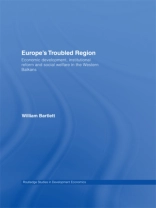The countries of the Western Balkans — Albania, Bosnia and Herzegovina, Croatia, Macedonia, Montenegro, Serbia and the province of Kosovo — form a core European region. The region is known for its instability and recent history of wars and civil conflicts, but far less is known about the changes that have taken place in the economic and social welfare systems and the dynamic processes of transition, development and European integration that have been taking place over the last twenty years.
Although economic growth has been firmly established, many problems remain in relation to the labour markets where there is high unemployment, large informal economies, and widespread poverty. The book discusses the role of welfare reforms, international aid and European integration in addressing these difficulties. The author argues that the resistance to reforms which were initiated under the communist system in former Yugoslavia led to the break up of the country and that since then a group of early reforming countries have made fast progress in institutional reform and have been at the forefront of EU integration. He also acknowledges that the main problems have been among a group of late reformers including two international protectorates where aid dependence has held back progress with institutional reforms. The book concludes that the resolution of these problems will unblock the completion of the transition, development and EU integration in the region and open for the way for a more stable and prosperous future.












